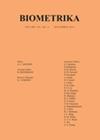基于条件秩相关的系统发育关联分析
IF 2.8
2区 数学
Q2 BIOLOGY
引用次数: 1
摘要
在微生物组研究中,系统发育关联分析在研究微生物组成与特定结果之间的相关性方面起着至关重要的作用。然而,测试这种关联的现有方法存在与高维环境下线性关联假设和混淆效应处理相关的局限性。因此,需要能够表征复杂关联的方法,包括非单调关系。本文介绍了一种新的系统发育关联分析框架和相关测试,通过使用条件等级相关作为关联度量来解决这些挑战。这些测试以完全非参数的方式考虑混杂因素,确保对异常值的鲁棒性和检测不同依赖关系的能力。所提出的框架使用加权和和最大化方法聚合子树的条件秩相关性,以捕获密集和稀疏信号。测试统计数据的显著性水平是通过最近邻自举方法校准确定的,该方法易于实现,并且可以在可用时容纳额外的数据集。通过利用模拟和真实微生物组数据集的数值实验证明了所提出框架的实际优势。本文章由计算机程序翻译,如有差异,请以英文原文为准。
Phylogenetic Association Analysis with Conditional Rank Correlation
Summary Phylogenetic association analysis plays a crucial role in investigating the correlation between microbial compositions and specific outcomes of interest in microbiome studies. However, existing methods for testing such associations have limitations related to the assumption of a linear association in high-dimensional settings and the handling of confounding effects. Therefore, there is a need for methods capable of characterizing complex associations, including nonmonotonic relationships. This paper introduces a novel phylogenetic association analysis framework and associated tests to address these challenges by employing conditional rank correlation as a measure of association. These tests account for confounders in a fully nonparametric manner, ensuring robustness against outliers and the ability to detect diverse dependencies. The proposed framework aggregates conditional rank correlations for subtrees using a weighted sum and maximum approach to capture both dense and sparse signals. The significance level of the test statistics is determined by calibrating through a nearest neighbour bootstrapping method, which is straightforward to implement and can accommodate additional datasets when available. The practical advantages of the proposed framework are demonstrated through numerical experiments utilizing both simulated and real microbiome datasets.
求助全文
通过发布文献求助,成功后即可免费获取论文全文。
去求助
来源期刊

Biometrika
生物-生物学
CiteScore
5.50
自引率
3.70%
发文量
56
审稿时长
6-12 weeks
期刊介绍:
Biometrika is primarily a journal of statistics in which emphasis is placed on papers containing original theoretical contributions of direct or potential value in applications. From time to time, papers in bordering fields are also published.
 求助内容:
求助内容: 应助结果提醒方式:
应助结果提醒方式:


